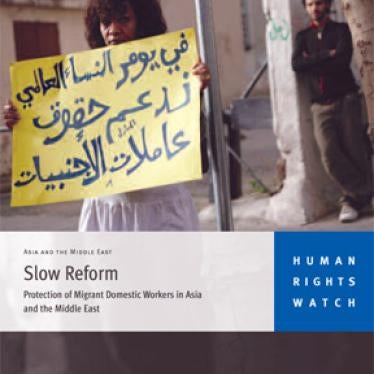(New York) - The Kuwaiti government's announcement that it will abolish its employer-based sponsorship system for recruiting migrant workers by February 2011 is a significant step to address a major source of labor abuse, Human Rights Watch said today. It is unclear, though, whether the change will apply to migrant domestic workers, who make up a significant proportion of the country's migrant workers but who are not covered by any labor law protections, Human Rights Watch said.
"This announcement is an important declaration that the Kuwaiti government is taking seriously the need to protect migrant workers," said Sarah Leah Whitson, Middle East director at Human Rights Watch. "But the government needs to say publicly what it plans to do and it needs to include domestic workers in its plans."
Kuwait's current sponsorship system ties a migrant worker's immigration status to an individual employer, or sponsor, without whose consent the worker cannot transfer employment. "Absconding" from the workplace is a criminal offense, even if a worker has left because of abuse. This system gives employers unchecked leverage and control over workers, who remain completely dependent upon the sponsoring employer for their livelihood.
Human Rights Watch has documented abuses of migrant workers enabled by sponsorship restrictions in Gulf countries, including in Kuwait. Employees can suffer physical and sexual abuse, and employers often withhold salaries, require long working hours with no time off, refuse to allow a worker to go home after an employment contract expires, and block avenues to redress. Human Rights Watch will release a report on October 6, 2010, at a news conference in Kuwait City about its findings in Kuwait.
The Labor Ministry announced in 2009 that the government would abolish the sponsorship system, but the promised reforms at that time were minor. Migrant workers were allowed to change sponsors without their consent, but only after completion of the initial employment contract or after three consecutive years of employment. Furthermore, the change did not include the country's 660,000 migrant domestic workers and offered no protection to workers in abusive employment conditions during the first three years.
"Any new system should allow workers to change or terminate employment at will, and should decriminalize 'absconding,' or leaving employment without an employer's permission," Whitson said. "The government should make its plans public and cooperate with civil society and the countries the workers come from to adopt the highest standard of protection for workers' rights."







